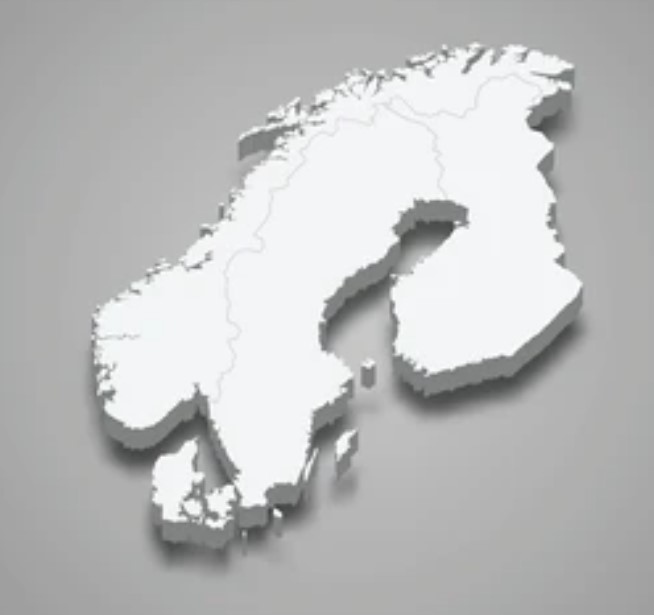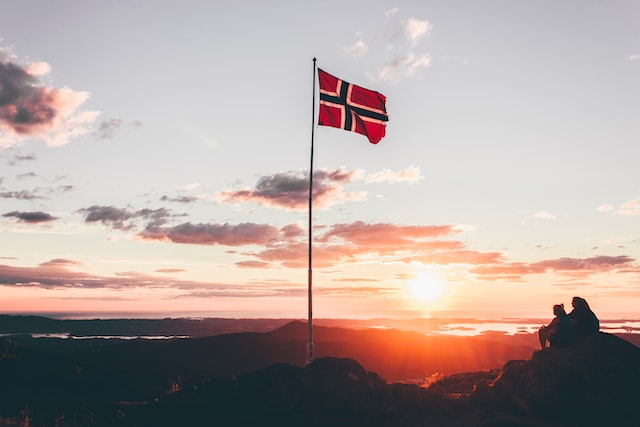
The Easiest Language To Learn For Norwegian Speakers
Speaking Norwegian may not seem like it has many uses outside of Norway, but the language is actually very helpful in helping you learn similar languages. In this article we’ll look at some of the other languages that will be within arms reach of any Norwegian speaker.

Key Takeaways
- Swedish and Danish are easiest to learn for a Norwegian speaker
- English and German are also accessible
- All languages in the Germanic language family share similarities with Norwegian
- Other languages outside the Germanic language family also share some similarities
- Find ways to motivate yourself when learning a new language
What Are The Top Easiest Languages For Norwegians To Learn?
Being a Germanic language, means that Norwegian share several similarities with a multitude of other languages. Some, like the North Germanic ones, are more similar than others. Let’s have a gander!
Swedish and Danish
The two languages that most closely resemble Norwegian, are also the closest ones geographically. Sweden and Denmark share a tangled and interesting history with Norway and all stem from the Old Norse spoken by the Vikings. As a result, the languages are quite similar today, and easy for any Norwegian speaker to get the hang of.
Norway was once ruled by Denmark for well over 400 years. After independence in 1814, we entered into a union with Sweden. This means that both Denmark and Sweden have made their mark on Norwegian.
We like to say that Scandinavia only has one language, Norwegian, but the Danes don’t know how to pronounce it, and the Swedes don’t know how to write it.
What this means is that written Danish is pretty much the same as Norwegian, but their pronunciation is way different. The opposite applies to Sweden. It will be easy for a Norwegian to understand spoken Swedish, but the spelling varies a lot from Norwegian.
So if you speak Norwegian, you can almost understand Danish or Swedish already, but if you want to make the switch to either of these languages, the road is not long.
Some tips will be to surround yourself with Swedish or Danish. Listen to music, podcasts, watch movies/TV and read newspapers and books in the languages. Pretty soon the language will become second nature.
Of course, most importantly, you’ll have to find others to practice speaking with. This is the most important part, and luckily you’ll find plenty of Swedes and Danes in Norway to communicate with.

English
English is another Germanic language, and one that shares plenty of similarities to Norwegian. English speakers will find that Norwegian is a language that is often touted as being one of the easiest to learn, and the same works the other way around.
Obviously, since you’re reading this, you speak at least some English. But we’ll still take a look at some of the things that make English easy to learn for Norwegian speakers.
English word order closely resembles Norwegian. This will not always be the case, but if you know the right vocabulary, you can roughly structure your sentences in the same way as you would in Norwegian.
Verb conjugation in English is also pretty similar to Norwegian, in that you only need to know how to conjugate for different tenses, not different subject pronouns.
Lastly, Norwegian has many loanwords from English, and even more cognates, so learning the vocabulary will be as easy as 1 2 3.
German
If you’re a Norwegian speaker, you’ve probably heard some German words that sound familiar to you. You may think that German would be easy to learn then, but that is not the case.
Even though the languages share many cognates, the big differences in grammar, conjugation and word order means that knowing Norwegian will not necessarily help you with German.
Some help can be found in the shared cognates. So you’ll understand some words here and there, and may be able to use context clues to understand sentences, but if you want to learn German, you’ll need to invest time and effort into understanding the different grammatical rules, how sentences are structured, and how verbs are conjugated not only for different tenses, but also for different subject pronouns.

What Factors Influence Language Difficulty For Norwegian Speakers?
Many factors will determine how easy a language is for a Norwegian speaker. We’ll assume that you only speak Norwegian and English here.
The language’s historical and cultural connections to other languages will be a key deciding factor. Like we’ve mentioned, Swedish and Danish are easy to learn, because the countries close ties throughout history.
Then we have the fact that Norwegian belongs to the Germanic language family, which means certain similarities will be shared with languages like English, German and Dutch, even though historically there is not as much overlap.
Lastly, what teaching resources you have access to, and what learning opportunities present themselves will also play a part. The bigger the language is, the more tools you’ll find online. Likewise, you’ll find more speakers of other languages the bigger it is, meaning you’ll have an easier time finding someone to practice with.
Linguistic similarities between Norwegian and other languages
Looking in terms of vocabulary, grammar and pronunciation, Norwegian is very similar to a multitude of other languages. Mainly, we’re thinking of Swedish and Danish, like we mentioned above. We can also mention English, since modern Norwegian has many loanwords from English, and most of the sounds produced in Norwegian exist in English.
But we can expand our gaze even further to languages like Icelandic for example. Another North Germanic language, Iceland is isolated from the rest of Scandinavia, and as a result the language is not mutually intelligible with Norwegian in the same way as Swedish or Danish. But, since it’s another language stemming from Old Norse, there will be some overlap in terms of grammar, vocabulary and pronunciation, that will be understandable for Norwegians, and
Other than that, all the rest of the Germanic languages will share some similar vocabulary, grammatical rules and pronunciation with Norwegian, but not to the extent that you can understand complete sentences.
Tired of scrolling through the internet for Norwegian grammar?
Start an organised Norwegian course now.
In order to learn fluent Norwegian, we need to repeat it and speak it several times before our brain learns it.
Learn that in our courses!
Other Accessible Languages For Norwegian Speakers
We’ve focused on the languages that are most like Norwegian up until now, but there are still several other languages that may be accessible for Norwegian speakers.
Dutch
Another Germanic language, Dutch shares similarities with Norwegian when looking at vocabulary, grammatical rules and syntax.
There are plenty of cognates shared between the two languages, so learning the vocabulary doesn’t mean starting from scratch.
Both countries also rank high in English proficiency in non-English speaking countries, with the Netherlands ranking number 1 and Norway number 4. This means you’ll most likely share a common language that can act as a bridge in your learning process.
Icelandic
Iceland is isolated from the rest of Scandinavia. As a result of this, much of the Old Norse language has survived in today’s Icelandic. Norwegian, on the other hand, has changed more over the years, but it still has its roots in the same language.
This means that the two languages have drifted apart since the time of the Vikings, but there will still be plenty of similarities for you to hang your Norwegian hat on if you’re attempting to learn Icelandic. Things like vocabulary, grammar, and pronunciation will come with some difficulties, but you won’t be starting from scratch.
Finnish
Finland shares a border with Norway, but it is not a Germanic language. Rather a Uralic one.
This means that Finnish does not share many similarities with Norwegian, even though you might think so given their geographical closeness.
Nevertheless, the countries have close cultural ties, and travel between the two countries is common. So finding a Finn to practice with, or vice versa will not be too difficult.
Understanding the culture of another nation is also an important part of learning a new language, and this will be a breeze for anyone familiar with Norwegian culture, as the two are quite similar culturally speaking.
Russian
This one is tough, since Russian is a slavic language. There won’t be much overlap in terms of grammar, vocabulary or pronunciation, and immigration between the two countries is not that common, so cultural overlap is not a given.
However, Norwegian uses gendered nouns, which affect conjugation. The same applies to Russian. So it might be an advantage for a Norwegian to learn Russian since they are already familiar with this aspect of grammar.
Additionally, Russian pronunciation is notoriously tough for English speakers, but it might be easier for someone who speaks Norwegian to get the difficult Russian pronunciation down.
Tips For Successful Language Learning As A Norwegian Speaker
No matter which language you want to learn, you should use Norwegian to your advantage if you know it. It’s often seen as one of the easiest languages to learn simply because it shares so many similarities with other languages.
So you’ll want to find out which similarities there are between Norwegian and the language you want to learn and focus on this in the beginning to aid your progress.
Immersion is also a key point in learning a new language. You can memorize vocabulary until you’re blue in the face, but seeing how it’s used in real world conversations and cenarios is necessary. You want to hear native speakers talk, write and converse as much as possible to make it part of your daily life. Find someone to speak with, speak with yourself, and generally try to use the language as much as possible.
Knowing vocabulary and grammatical rules is pointless if you can’t use it in real situations. So try to find someone to speak with on a regular basis. Sure you’ll make plenty of mistakes, but that’s how we learn. Eventually you’ll get a feel for the language and can conjugate like nobody’s business!
Our final point is to set some realistic goals for yourself. Rome wasn’t built in a day, and neither is learning a language. If you think how far away from 100% fluency you are, you might get demotivated. Rather, try thinking how far away you are from minor goals, like introducing yourself, or ordering a cup of coffee, and you’ll have several milestones to go by and keep you motivated.
Reach fluent Norwegian in only 4 months
Find out your level and how to get started now
Did you know that you don’t need all the Norwegian grammar to speak Norwegian? Just a small part of it. In our classes we use just the necessary grammar. Find out what level you are, and what classes you can take to speak fluently.
How Does Motivation Impact Language Learning?
We can point out that you won’t get anywhere if you’re not motivated. Learning a new language is not always a fun process. You might hit a roadblock and get demotivated, and you need to know that this is part of the process. It is absolutely necessary to find things that motivate you to keep going.
We’ve mentioned how setting small goals to track your progress can help you here. You can also envision your reasons for deciding to learn a new language. Maybe you’re trying to reach new heights in your career, perhaps you want to impress a romantic partner, or maybe you’re preparing for an upcoming trip.
Whatever the reason, try to imagine what difference knowing the language will make for your end goal. Most likely it will enrich every experience you have, and might keep you going.
You also need to find a learning method that is fun and effective for you. Reading a book and taking notes may not be everyone’s cup of tea, so think about how you like to learn and go all in on those methods. You’re not in school anymore, you decide how and when you want to learn, so by all means, go your own way.
Frequently Asked Questions About The Easiest Language To Learn For Norwegian
What Is The Easiest Language To Learn For Norwegian Speakers?
The other Scandinavian languages, Swedish and Danish will be the easiest languages to learn for a Norwegian speaker.
What Are Other Accessible Languages For Norwegian Speakers?
English, Dutch and German are different from Norwegian, but they are still quite accessible for a Norwegian speaker given the fact that they share many similarities with Norwegian.
Learn fluent Norwegian in 4 months. Start today.
Did you know that you don’t need all the grammar to speak fluent Norwegian? In our classes we focus just on the necessary vocabulary. So you can learn 3 times faster.






